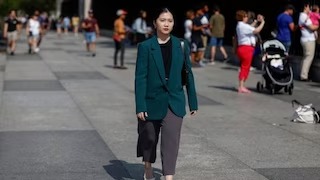July 12 – For Anna Kwok, a Washington-based Hong Kong activist, the imposition of a Hong Kong police bounty for her arrest has underscored the urgency of her bid for political asylum at a time of growing tensions between the United States and China.
The Hong Kong native, who left the territory in early 2020, is part of a small band of overseas activists speaking out on human rights violations in the global financial hub in the aftermath of a China-imposed national security law.
Last week, Hong Kong police sought to ramp up pressure on Kwok and seven other overseas-based activists – including those now residing in Australia, Britain and the U.S. – issuing arrest warrants for alleged national security violations and offering bounties of HK$1 million ($127,656) for each arrest.
“It’s something that I’m still digesting mentally within me,” the 26-year-old Kwok said in a telephone call from her apartment in Washington. “They are, you know, giving me more reason to fight on … ”
She said she would continue lobbying Congress members and other U.S. officials on Hong Kong issues despite fears for her personal safety given the sizeable bounty on her head. She recently raised those concerns in meetings with U.S. authorities.
“We are looking for ways to ensure that I can be safe in the U.S. and I’m also continuing to speak to other civil society partners who do have resources and experience in dealing and protecting dissidents from dictatorship regimes,” she said.
ASYLUM UNCERTAINTY
Kwok said the warrants confirmed what she has long suspected – that returning home would be impossible since it would lead to almost certain arrest. The last time she saw her family was over three years ago.
Kwok’s bid for political asylum in the United States remains in limbo, however, one year after applying.
“There’s a piece of anxiety that you don’t know what may happen and the slim chance that they reject my application,” added Kwok, who is currently covered by Deferred Enforced Departure (DED) status that provides her with a temporary safe haven in the U.S.
Over the past few years, Kwok acknowledges that she has sometimes battled depression as friends back home were jailed, and as Hong Kong fell out of the global spotlight. To ease the pressure of working long hours and most weekends, she occasionally does yoga or plays video games.
“With on-the-ground movements in Hong Kong disappearing or silenced, it’s really up to us to narrate the story of Hong Kong,” said Kwok. “Hong Kong is not just about human rights abuses, Hong Kong is also about authoritarian expansion waged by the Chinese government.”
Hong Kong was once considered a bastion of freedoms on China’s doorstep, enjoying a separate and independent judicial system from China under a “one country, two systems” arrangement when it returned from British to Chinese rule in 1997.
Since the 2020 imposition of the national security law, most of the democratic opposition has been jailed or exiled. An electoral overhaul has also effectively barred democracy proponents from legislative and district elections.
Hong Kong authorities say the security law has brought stability, and that the eight “absconders” including Kwok, by asking foreign powers to impose sanctions on Hong Kong amongst other activities, continue to endanger national security.
Besides lobbying work, and building alliances with activists, NGOs and the overseas Hong Kong diaspora in the U.S. capital, Kwok’s group, The Hong Kong Democracy Council, also conducts research including a database on over 1,500 “political prisoners” in Hong Kong.
A recent report also detailed the political and lobbying activities of the Hong Kong government, including through its U.S.-based trade offices, to advance China’s interests at a time of growing geopolitical tensions between the two superpowers.
“I do see myself staying here for the foreseeable future,” Kwok said from her Washington apartment.
“It’s going to be a contest between D.C. and Beijing. And I do hope that we can help to make D.C. really the trendsetter, or the one dominating the dance with China.”









































